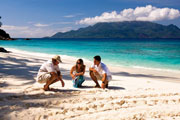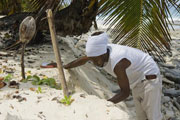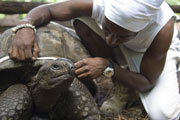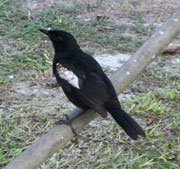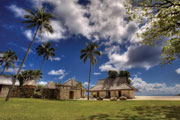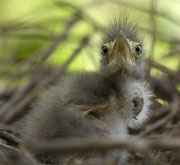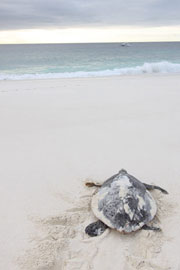Following the collapse of the coconut industry in the 1970s, many foreign and invasive species were left behind, including coconuts, cows, rats, cats and pigs and a particularly invasive weed by the name of lantana. Such unwanted species were to have a detrimental effect on the island's ecosystem. Indigenous plant species were smothered by invasive weeds, bird populations decreased and marshland dried up. It was soon realised that drastic actions needed to be taken in order to safeguard the island from possible extinctions and further destruction.
By way of restoring the island to its former glory, a pioneering initiative known as the "Noah's Ark" concept was adopted. Restoration efforts for Noah's Ark included re-introducing giant tortoises and certain bird species to the island as well as such indigenous trees as takamaka, badamier and the well renowned coco-de-mer palm. The initiative has also included introducing endangered flora and fauna to the island in order to help preserve some of Seychelles treasured endemic species.
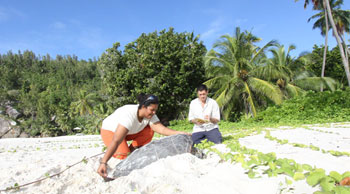
Years of co-ordination and research between government conservation bodies has ensured the continual protection of North Island's natural environment and precious biodiversity. Efforts have been made to recycle materials and rehabilitate existing structures wherever possible.
The island's architects have been conscious to keep development, noise and disruption to a minimum, meanwhile also preserving historical sites. Many of the island's felled alien trees such as the casuarinas as well as dead takamaka trees have been used in the construction of North Island's buildings. In fact, the island's library and dive centre were originally copra shacks. There is also a great emphasis on eradicating alien flora and fauna, re-planting lost species, conserving water and installing an ecologically sensitive sewerage system.
North Island's conservation processes have proved not only to be successful, but also inspirational, paving the way for continued efforts now and for the future. They have already facilitated the return of at least three indigenous birds, including the Black Paradise Flycatcher, Seychelles Warbler and the critically endangered Seychelles Magpie Robin.
Photographs kindly provided by Holly Payne
Praslin - La Digue - Aldabra - Bird Island - Mahe - Islands of the Sainte Anne Marine Park - Desroches & the Amirantes - Silhouette - North Island - Fregate - Cousine - Cousin - Aride - Denis - Alphonse - Felicite - Marianne - Victoria - Assumption - Cosmelido - Vallée de Mai - Coco de Mer - St Pierre - Seychelles Black Parrot - Seychelles Blue Pigeon - Seychelles Fruit Bat - Seychelles Paradise Flycatcher - Scops Owl - Giant Tortoise - Tailor Made Holiday in the Seychelles - Bareboat & Skippered Yacht Charters - Sailing Guide to Seychelles - Liveaboard Diving - Dive & Snorkel Holidays - Wildlife Natural History & Birdwatching - Beaches - beach vacations - Marine Life whales sharks rays dolphins & coral reefs - Hiking Trekking Car Rentals Hotels Resorts & Accommodation - Mountains & Rainforest - Responsible Travel - Honeymoons & weddings - Family Adventures - Single Travellers - Whale Shark Research & Conservation


